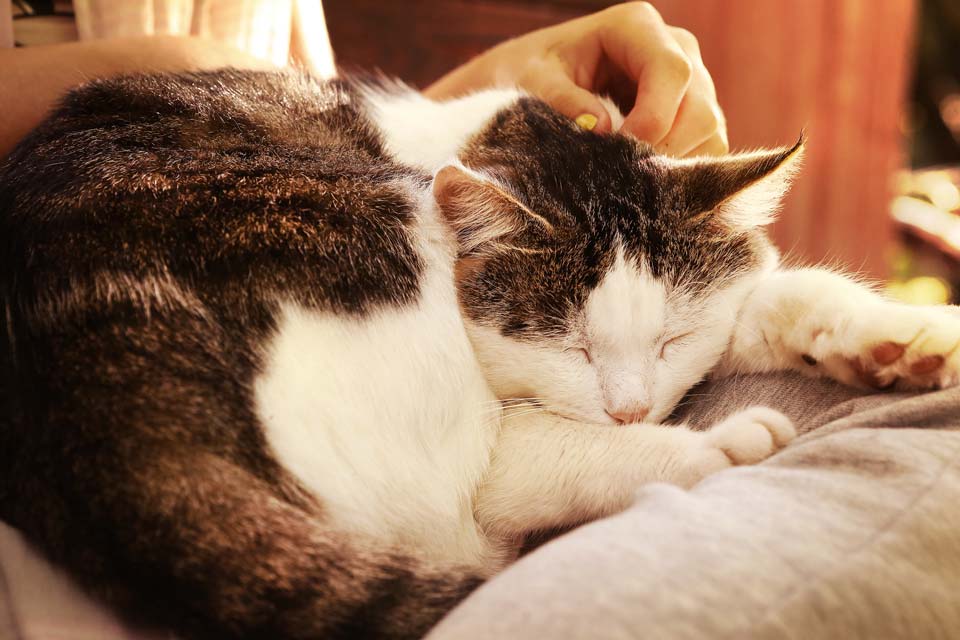Caring for Your Senior Feline

Statistics show that cats, like people, are living longer, thanks to advances in veterinary science, nutrition, and therapeutics, as well as an increase in the proportion of cats living indoors or whose access to the outdoors is restricted to leash walks and/or escape-proof enclosed structures. In fact, the percentage of house cats aged 6 and above has doubled over the last 25 years. This coincides with a growing appreciation for cats as a unique species with a special physiology and set of behavioral needs requiring customized care both from a veterinary and lifestyle perspective. With continued progress, more and more cats will thrive long into their golden years.
Better Lives for Senior Cats: The Result of a Cooperative Effort
Both you and your veterinarian contribute to your cat's quality of life as he or she gets older. You provide a home environment that is non-stressful yet fulfilling to your cat, and your veterinarian diagnoses your cat's physical condition, attends to his or her medical needs, and offers advice on wellness and preventive measures. Of course, you bring your cat in for regular veterinary check-ups and consult with your veterinarian when you notice unusual or unexplained changes in your cat's appearance or behavior.
Time Flies for Humans and Cats
It may seem like only yesterday that you brought home that playful, bouncy kitten. But by age 7, your cat has entered middle age. By 12 years of age your cat is becoming a senior citizen, and by 15 she is considered "geriatric" (see chart below). While the average lifespan for a spayed or neutered house cat is 14-16 years, many felines are now living into their late teens and even their early twenties.
Age Comparison of Cats and Humans
|
Cat Years
Human Years
Life Stage
|
|
1 year
15 years
Adolescent
|
|
2 years
24 years
Young adult
|
|
5 years
36 years
Adult
|
|
7 years
45 years
Middle aged
|
|
12 years
64 years
Senior
|
|
15 years
76 years
Geriatric
|
|
18 years
88 years
|
|
21 years
100 years
|
What Is Aging?
Aging is a normal biologic process associated with gradual decreases in organ function that increase the susceptibility to disease. It is not a disease in and of itself. The results of aging are slowly progressive and often irreversible. However, with close attention and proper care, it is often possible to "slow the clock," extending your cat's good quality of life for many years.
The following are some changes you may expect to see as your cat ages:
- Thinner, less-elastic skin
- Overgrown, brittle nails
- Dull coat, fur matting
- Weight gain (middle age); weight loss (geriatric)
- Gradual loss of muscle mass
- Slight haziness to the eyes; lacy appearance to the iris (colored part)
- Decreased senses of smell and hearing
- Dental disease, bad breath
- Slowing appetite
- Stiff joints, decreased physical activity
- Increased sensitivity to cold, stress, or changes at home
- Increased need for sleep
- Personality changes (more irritable, more mellow, more vocal, etc.)
The signs of aging in cats are natural and can occur very slowly, often without notice. Sudden or dramatic changes in your older cat's appearance or behavior should not be considered normal and may signal that something is wrong.
Diseases That Are More Common in Older Cats
Certain diseases are much more prevalent as cats age. Don't assume your cat's signs are just from old age and therefore inevitable. They may indicate a common medical problem that is quite treatable. Examples include:
Dental Disease. This is the most common disease affecting older cats, and its significance is often underestimated. In fact, one study showed that 80 percent of cats already have a form of dental disease by just 3 years of age. Dental problems can cause pain, difficulty eating, and gum line infections that can travel via the bloodstream and affect vital organs. Your veterinarian will recommend a dental care plan that may include home care (tooth-brushing), special diets, and professional cleanings. Learn more: "Home Dental Care for Cats."
Chronic Kidney Disease. Cats' kidneys commonly undergo several aging changes that can eventually lead to decreased function. Signs vary widely but can include increased thirst and urination, weight loss, vomiting, and lethargy. The disease itself is irreversible, but early detection and modern advances in treatment can dramatically improve quality and length of life for these kitties. Learn more: "Kidney Disease in Cats."
Hyperthyroidism. An overactive thyroid gland causes weight loss, increased appetite and thirst, hyperactivity, irritability, cardiac and gastrointestinal problems in cats. It's the opposite of hypothyroidism, an underactive thyroid, as most often occurs in dogs and people. Hyperthyroidism is diagnosed with a simple blood test and can be very successfully managed by your vet when detected in time. More information is available here: "Hyperthyroidism in Cats."
Hypertension. As in humans, high blood pressure, or hypertension, in cats is an insidious problem with few outward signs. But it can be damaging to several vital organs, including the heart, kidneys, brain, and eyes. Hypertensive cats usually have either kidney disease or hyperthyroidism. Successful treatment must address the full scope of the problem. Learn more: "Feline Hypertension."
Diabetes Mellitus. Diabetes is on the rise among cats as well as humans. In both species, diet, lifestyle, and genes are to blame. Signs of diabetes in cats include weight loss, excessive thirst and urination, and appetite changes. Dietary management and often insulin therapy are the cornerstones of treatment. Find out more: "Feline Diabetes Mellitus."
Inflammatory Bowel Disease (IBD). Comparable to Crohn's disease and ulcerative colitis in people, IBD is a chronic inflammation of the digestive tract that causes cramping, vomiting, diarrhea, and weight loss. Treatment includes dietary management and medication. More information is available here: "Inflammatory Bowel Disease in Cats."
Arthritis. While it's common for elderly cats to move less and sleep more, a noticeable stiffness, trouble jumping, a lapse in grooming, and general inactivity can be signs of painful degenerative changes in your cat's shoulders, elbows, hips, knees, or spine. A thorough veterinary examination, possibly with x-rays, can pinpoint this problem. New advances in pain treatment can work wonders for creaky kitties. Never give your cat pain medicines unless specifically prescribed by your veterinarian. This includes both common over-the-counter medicines (aspirin, Ibuprofen) and prescription medications, even those intended for another pet. Cats are uniquely sensitive to many medications. For example, a single dose of Tylenol can be fatal to a cat. Learn more: "Arthritis in Cats."
Cancer. While lymphoma is the most common cancer in cats, breast, skin, oral, intestinal, lung, liver, and bone cancers are also on the list. For cats and humans alike, early detection is key when it comes to beating cancer. This is why careful observation and regular veterinary exams are key as your cat ages. Learn more: "Cancer in Cats."
Cognitive Dysfunction. Age-related dementia can happen in cats just as it does in people. Signs include personality changes, irritability, altered sleep/wake cycles, nighttime vocalization, disorientation, appetite loss, and inappropriate elimination. Medical therapy is helpful in some cases. Since the signs of cognitive dysfunction can coincide with other common older-age afflictions, it's essential to mention these problems to your veterinarian. More information is available in this article: "Feline Senility: Cognitive Disorder in Cats."
How Can I Help Keep My Older Cat Healthy?
It's wise to consider adding a nutritional supplement containing enzymes, probiotics, and antioxidants to your cat's food. These additives can be helpful for aging cats for generally the same reasons that they benefit people.
- Enzymes and probiotics ("good bacteria") help your cat absorb nutrients more efficiently and aid in proper elimination of byproducts, thus promoting gastrointestinal health.
- Antioxidants such as vitamins C and E, CoQ10, and alphalipoic acid help stave off degenerative diseases such as arthritis and cancer and help support brain function.
Optimal nutrition provides the building blocks for a stronger immune system, one that is better able to fight off infections, degenerative diseases, and cancer.
Good nutrition is the foundation of a healthy plan for your cat's golden years. Provide the highest quality diet that your cat is willing to eat. Unless your veterinarian instructs otherwise, opt for a senior formula. These contain fewer calories to curb weight gain but have better digestibility, and contain extra fiber, vitamins, and fatty acids to account for slower digestive function. Feed smaller meals more frequently. Canned food is often more palatable for a cat with a dulled sense of smell or dental issues. Be sure to consult your veterinarian for specific advice about the best diet for your older cat. And don't forget to provide plenty of fresh water daily.
Grooming and self-care can go by the wayside as cats age. Help your feline by brushing her regularly to avoid mats and by keeping her claws trimmed. Grooming and rhythmic petting help deepen your bond while improving your cat's circulation. Regular, gentle playtimes help maintain fitness and mobility. Provide her with warm, well-padded, and easily accessible sleeping places. Try to limit environmental stressors like extreme cold, heat, unfamiliar surroundings, or a rambunctious new pet. And don't forget to make food, water, and litter pans easily accessible. Choose litter pans with at least one low side for easier entry. Homemade ramps can help your kitty access his favorite sleeping places, or you can consider adding pet steps. Not only do they facilitate access to your kitty's favorite high spots, but they are also soft and comfortable, providing a great place for a catnap.
Senior Kitty 911
Knowing when to blow the whistle requires a watchful eye and an appreciation for what is and isn't normal for your own cat. Contact your veterinarian right away if you notice any of these warning signs.
- Decreased or sharply increased appetite
- Increased thirst
- Vomiting
- Constipation or diarrhea
- Change in urinary habits
- Persistent cough or heavy breathing
- Lethargy, listlessness
- Weight loss
- Bad breath
- New lumps or bumps on the skin
- Lapse in grooming habits
- Stiffness, trouble jumping
- Behavior changes such as neediness, disorientation, irritability
And finally, preventive veterinary care is critical. The American Association of Feline Practitioners recommends that senior felines visit the vet twice yearly; more often when ongoing medical conditions are present. Your veterinarian will ask a series of questions followed by performing a full physical and laboratory evaluation aimed at early detection and treatment of health setbacks. She or he will be glad to help construct a comprehensive plan for the best health, nutrition, and comfort of your older feline friend.
With conscientious care and a little luck, your cat can remain happy and healthy for all of her nine lives!
You May Also Like These Articles:
Giving Your Cat Clean and Fresh Water
Feline Senility: Cognitive Disorder in Cats





